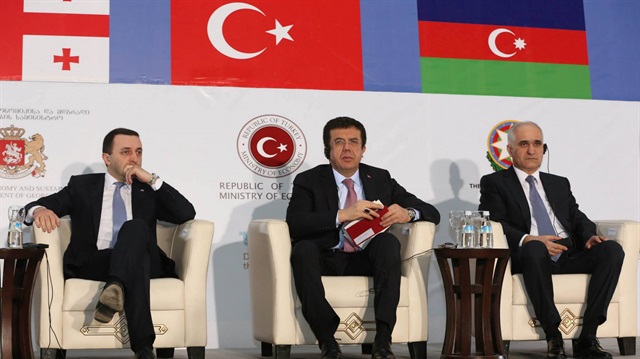
So far this year I have addressed the challenges facing Turkish diplomacy in the context of two different triangles:
Turkey-Russia-U.S. and Turkey-Russia-Iran. In February, Istanbul hosted the Fifth Turkey-Azerbaijan-Georgia Business Forum. This month, therefore, I look at this smaller triangle, a little closer to home – Turkey-Azerbaijan-Georgia – and the idea of expanding it to include Iran.
Practical Turkey-Azerbaijan-Georgia cooperation dates from the late 1990s, when the three countries cooperated on creating the conditions for construction of the Baku-Tbilisi-Ceyhan (BTC) oil export pipeline. This was the first pipeline in the history of the world industry to cross three countries: the producing country, Azerbaijan; the transit country, Georgia; and the exporting country, Turkey. The geopolitical engineering required was even more daunting and impressive than the geophysical and chemical engineering.
Inspired by that, the Brussels-based Centre for European Policy Studies undertook a detailed review of energy and security issues in the region. Its policy recommendations were entirely adopted by a major report of a European Parliament committee. From there, they became part of the European Commission's strategy for the region, notably leading to the Baku Initiative in 2004, and the 2006 inter-ministerial Astana Declaration by states from the EU to the Caspian Sea littoral, including the Black Sea, for enhanced energy cooperation.
Turkey-Azerbaijan-Georgia cooperation is more thoroughly and comprehensively developed than either of the two other triangular forums: Turkey-Azerbaijan-Iran and Turkey-Azerbaijan-Turkmenistan. There is some rather limited defense and security cooperation, wide and significant energy and transport cooperation and increasing economic and business cooperation. It was at this last-named issue area that the trilateral Business Forum is aimed.
What is potentially more significant than any cooperation agreed to at the meeting of this Fifth Business Forum in February is that Azerbaijan's economic development minister, Shahin Mustafayev, has publicly suggested the possibility of inviting Iran to attend the Sixth Business Forum, which may be held in Nakhchivan on a future date to be decided. The logic in inviting Tehran to Nakhchivan is geographic, even though Iran's help is not needed for the Kars-Iğdır-Nakhchivan rail line under discussion. It is also not yet absolutely clear whether this is a one-time invitation to Iran or whether the forum will transform permanently from trilateral to quadrilateral.
If it transforms into a permanent quadrilateral, and if Azerbaijani-Irani relations continue to improve, as they have done since President İlham Aliyev's visit to Tehran a year ago, then this will be the reflection of a larger reconfiguration. For most of the last quarter-century, since the disintegration of the Soviet Union, there has been a division between an Azerbaijan-Georgia-Turkey cooperation on the one hand and, on the other, an axis comprising Armenia, Russia and Iran.
In the past, I have discussed the emerging Azerbaijan-Iran-Russia cooperation in which India is also implicated through possible commerce routes to Moscow and Europe via Chabahar on Iran's southeastern coast. The possible emergence of an Azerbaijan-Iran-Russia trilateral already signifies the breakdown of the two trilaterals mentioned in the last paragraph. Russia has been abandoning Armenia for some time – and Yerevan has nowhere to turn for help – now that the American withdrawal of influence from the Caucasus region over the last eight years has given Moscow the opportunity to increase pressure on other states in the South Caucasus. Azerbaijan now buys the majority of its arms from Russia, although at international prices rather than at the domestic prices offered to Armenia.
Azerbaijan's invitation to Iran is certainly made with an eye toward normalizing Tehran's threats against Baku, where Revolutionary Guard agents have been found in past years planning and even carrying out acts of violence and terrorism. Iran has viewed Azerbaijan as an existential threat, because Baku's population is majority Shiite, yet the state is secular and not theocratic. So, Iran has threatened Azerbaijan in the past and seeks, now by other means, to "neutralize" it. Iran is a strategic competitor against Turkey and will never cooperate more than tactically. But Azerbaijan may be compelled to cooperate strategically with Iran in the context of the Azerbaijan-Iran-Russian transport corridor. Militarily of course, Azerbaijan will always be inclined toward Russia if forced to choose between the two. But bringing Iran into Turkey-Azerbaijan-Georgia trilateral cooperation is not necessarily in Turkey's interest.
Ankara deals with Tehran better on a bilateral than multilateral basis. However, Turkey's solidarity with Azerbaijan, especially concerning the sometimes difficult situation in Nakhechivan, modifies that calculus. Whether Iran seeks genuinely to cooperate for mutual benefit or instead only to disturb the relations among others who are already cooperating will become clearer in the near future.
Mustafayev has said that work is under way to try to create an Azerbaijan-Iran-Turkey trilateral cooperation forma . This makes more sense than a real quadrilateral format including Georgia even though meetings of the trilaterals may occur simultaneously














